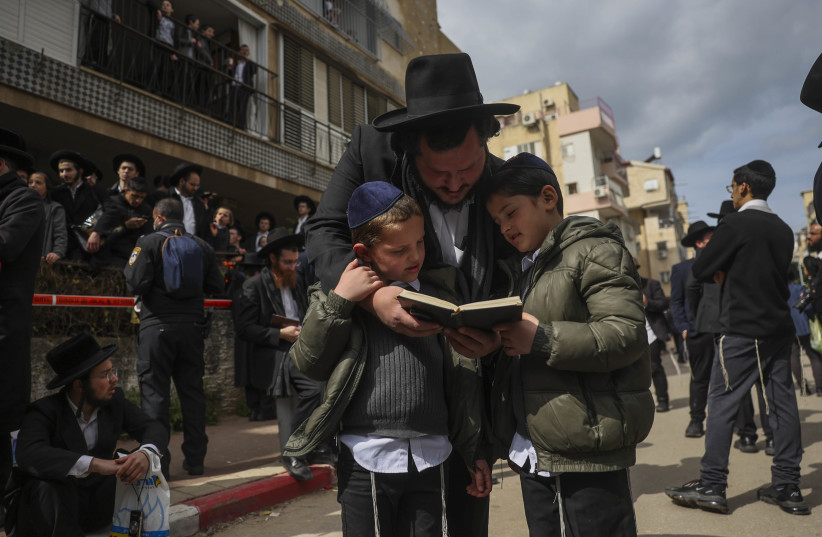He had neither material wealth, particularly good looks nor charisma, and he did not spend his life in search of the spotlight, yet an estimated half-million people turned out Sunday on an unseasonably chilly March Bnei Brak day to pay final respects to Rabbi Chaim Kanievsky, who died on Friday at the age of 94.
For hours they stood in fearfully crowded conditions, as the police – traumatized by the Meron disaster last Lag Ba’omer – worried and warned of people being crushed by the enormous crowds. The massive crowd recited Psalms and heard long eulogies loudly bewailing the loss of a spiritual leader known to millions of religious Jews worldwide simply as “Reb Chaim.”
Tourists who might have landed at Ben-Gurion Airport Sunday morning and found themselves trapped in a massive traffic jam, or people around the world just watching images on television of a river of black hats flowing toward a cemetery, could have been excused for thinking that this was a funeral for a king, beloved president or feared dictator.
Forget people from abroad, to many in the nonreligious Israeli public, the spectacle of so many people turning out for such a funeral – and the fact that the country’s four television stations all broadcast the funeral procession live for several hours – seemed hard to fathom and difficult to relate to. All the more so because closed roads kept parents home from work and children home from school.
What was the pull of this nonagenarian who lived in a small rundown apartment and, according to lore spun around him, studied Torah for 17 hours a day and was so detached from the world that he did not know what basketball was until he was asked a halachic question whether it could be played on Shabbat?

Unlike other prominent haredi (ultra-Orthodox) rabbis throughout the years who both held sway in the haredi world and were well known by the secular public – either because they issued halachic rulings that jarred the sensibilities of the general public, or because they held enormous political power – Kanievsky was relatively unknown by the secular public for the first 92 years of his life.
He was no Rabbi Eliezer Schach or Rabbi Ovadia Yosef – rabbis whose words, in addition to deciding halachic matters, also formed and brought down governments and stirred endless controversy.
Kanievsky burst onto the national scene not amid a political campaign by actively campaigning for one party or another, but rather at the beginning of the COVID-19 pandemic in 2020 when he came out against closing haredi schools and yeshivot, even though the non-haredi school system across the land was shut down.
This thrust him into the national consciousness as a polarizing figure – ironic, considering his modest and unassuming manner. But that changed a few months later when he was widely hailed by non-haredi opinion-makers for encouraging coronavirus vaccines for children aged five and up.
What was his attraction? What was his pull? Why did so many invite hours of discomfort and inconvenience to attend his funeral procession?
THE ANSWER is that those at his funeral were paying homage both to the rabbi – a man whose Torah erudition was as legendary as his simple lifestyle and his distinguished lineage – as well as to what he represented.
People would flock to his home from all over the Jewish world, believing that a blessing from him – his uttering of the phrase “bu’ah,” an abbreviation of the Hebrew words bracha v’hatzlacha (blessing and success) – would prove effective. He was a unique rabbinic personage whose humble personality, personal history and encyclopedic knowledge of the Jewish sources made it possible for him to appeal to all three major streams of the haredi world: the Lithuanian, hassidic and Sephardi.
But more than being a religious leader, he also represented the aspirational ideal for the haredi community. Kanievsky was a man who shunned material wealth and did not seek fame – but only wanted to learn, learn some more, and then continue learning.
As one commentator said during his funeral, he opened a book of Torah at the age of three and only closed it last Friday, 91 years later. And in the meantime, he studied continuously.
That is the haredi ideal, one that only very few come close to realizing. By coming out in mass to pay their respects to the rabbi, the hundreds of thousands of haredim at Kanievsky’s funeral were venerating the ideal that he represented, even though – or perhaps because – they know it is one they will fall short of attaining. Their coming out en masse was also a statement: That ideal is who we are.
Like the deaths of other great rabbis and halachic arbiters of the last generation – Rabbi Shlomo Zalman Auerbach in 1995, Rabbi Eliezer Schach in 2001, Rabbi Ovadia Yosef in 2013 and Rabbi Aharon Yehudah Leib Steinman in 2017 – funerals of great sages leave a vacuum in the haredi world, one that leads to the inescapable question: Who will be able to fill the gaping void.
Inevitably, people will say that the deceased is irreplaceable, and – just as inevitably – another sage, one often not well known outside the confines of the haredi world, will emerge to wear the mantle that Kanievsky wore for the last few years: “Torah giant of the generation.”
